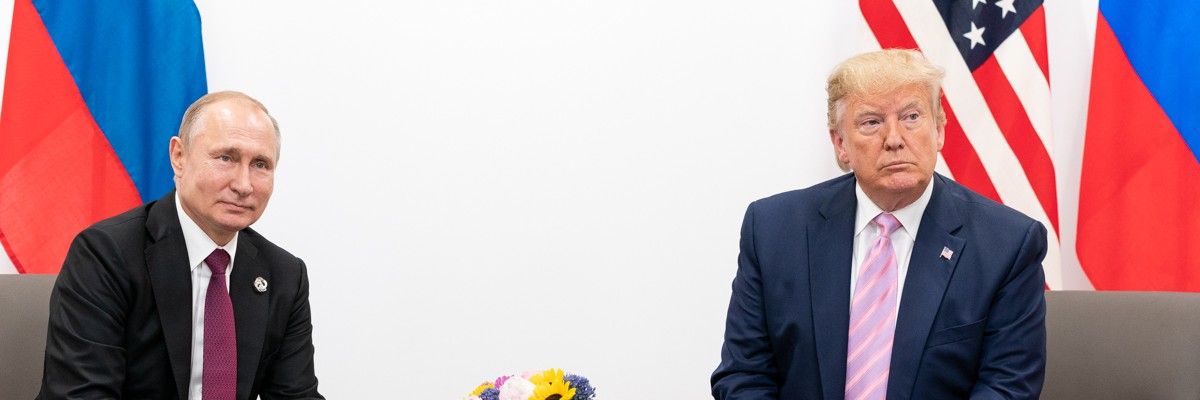The Russian government paying bounties to Taliban militants to kill American soldiers in Afghanistan blasted through the COVID dominated headlines this summer as lawmakers and pundits demanded to know why President Trump wasn’t taking the intelligence seriously.
But months later, news that the intelligence has remained unconfirmed by military officials on the ground in Afghanistan has barely made a blip on the radar, suggesting that the story was never more than a disputed, unsubstantiated bit of raw intelligence whose only purpose was to provide rhetorical cannon fodder for Trump’s critics and the worst elements of the foreign policy blob.
The allegation first appeared on the front page of The New York Times on June 26, and within 48 hours was repeated by The Wall Street Journal and The Washington Post. From the original Times report, “The United States concluded months ago that the Russian [intelligence] unit…had covertly offered rewards for successful attacks last year.” The Post treated “the existence of the bounty program” as flat fact, while the Journal used affirming language toward “a classified American intelligence assessment” that reached that conclusion.
From the beginning, the story lacked legs. None of the outlets had been provided this “report,” and only been told of its existence. They were informed by “officials familiar with the matter,” without specifying which branch of intelligence the officials represented, if any. The Post speculated how many U.S. soldiers could have been the victim of such a bounty program, without referencing any specific attacks. The only light shined on the origins of the claim was that it was the result of human intelligence gathered from captured Taliban fighters.
Three days after its initial report, the Journal had to walk back its assuredness after receiving significant pushback from the National Security Agency. Evidently the U.S. government agency charged with collecting and monitoring every phone call, digital communication, and cyber transaction on Earth could provide no corroboration for the bounty story. Likewise, the Defense Intelligence Agency and the Pentagon at-large had low confidence that the information was accurate. The report, it turned out, had been a contrived CIA product that possessed no sourcing besides an unknown number of Taliban prisoners.
Following a two-month Defense Department investigation overturning every Afghan rock, there remains no reason to believe Russia ever instituted such a bounty program. “It just has not been proved to a level of certainty that satisfies me,” General Frank McKenzie, commander of U.S. Central Command, said earlier this month. “We continue to look for that evidence…I just haven’t seen it yet.”
The reason the American media latched onto an unverified bit of raw intelligence isn’t difficult to discern. The report fit the narrative of Trump’s seemingly cozy relationship with Vladimir Putin. It also became leverage against the Trump administration’s plans to withdraw completely from the U.S. war in Afghanistan. And it didn’t help Trump’s cause when he immediately reacted defensively to the initial reports as “fake news” and did not seem to have a well coordinated response with other White House officials.
So for two-weeks the public was subjected to a news cycle where cable hosts and contributors fearmongered about Putin collecting the scalps of U.S. soldiers.
MSNBC host Rachel Maddow, who for years has been one of the most heavy-duty promoters of Trump-Putin espionage conspiracy theories, didn’t miss a beat. “Not only does the President know that Russia was paying for American soldiers’ deaths, paying rewards for Americans dead,” Maddow said, but Donald Trump was giving a “unilateral strategic gift” to Russia by withdrawing a portion of the U.S. military presence in Germany. “That’s how President Trump is standing up for Americans being killed for rubles paid by Putin’s government.”
Maddow was joined by her fellow MSNBC host Joy Ann Reid, who even into September has continued to push the disproven narrative about the bounties. To respond to the report, Reid interviewed Steve Schmidt, the once establishment Republican who disowned the party after Trump’s election. According to Schmidt, who last year co-founded the pro-Biden Lincoln Project PAC, Trump “kowtows and gets on his knees with deference to a hostile foreign power’s autocratic leader.”
The language was as heated elsewhere. CNN analyst Asha Rangappa has demanded the administration “punish” the Russian government for what she labeled “assassinations.” MSNBC contributor Malcolm Nance said on-air that it was possible all 18 U.S. combat deaths in Afghanistan in 2019 could be the result of Russian bounties.
CNN host Jake Tapper was more circumspect in his comments. Even if the bounties story was false, he admitted, there are disputed reports from 2017 of Russia selling weapons to the Taliban. And that, in his mind, is enough to accuse Trump of weakness.
Pundits like Maddow, Schmidt, Rangappa, and others often ignore that under Trump, the United States has increased sanctions on the Kremlin, increased the number of NATO military exercises along the Russian border, and even approved lethal aid to Ukraine — a measure rejected by the Obama administration. The White House also cited Russian intransigence when moving forward on dismantling the nuclear non-proliferation infrastructure, including a withdrawal from the INF Treaty, the Open Skies Treaty, and the expiration of New START.
While Trump has rightly been criticized for these policies, the attacks, however unsubstantiated, are amplified many times over when he indicates that he may take his foot off the gas — such as not condemning the Russian government for a bounty program that doesn’t exist. This sustained effort to promote the unsubstantiated intelligence on Russian bounties has had its intended effect. A Reuters poll taken in July showed that 60 percent of Americans found the bounty story either “very” or “somewhat” believable, despite a dearth of any supporting evidence. And the lack of repentance from those individuals who participated — and continue to participate — in carrying water for a thus far baseless story is to the permanent shame of the American media.
















